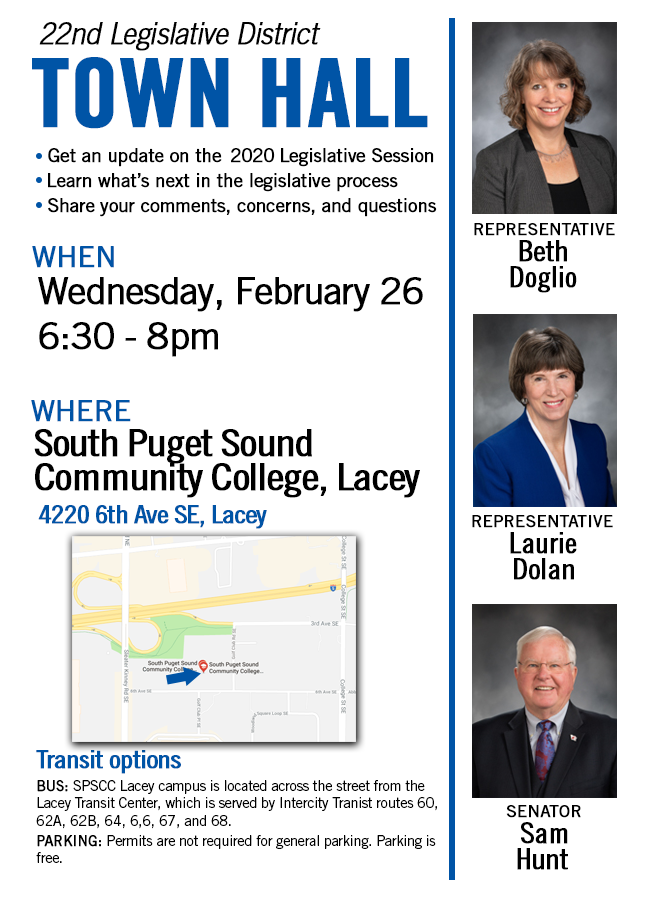
Dear Friends and Neighbors,
For us as state legislators, the budgets we put forward aren’t just a way to respond to the needs of our community; they’re a reflection of our values as Democrats. Even though this is a supplemental budget year, essentially an opportunity to make adjustments to the two-year biennial budgets we passed last year, we’re putting people first with investments that help our communities thrive. We make good use of our state’s positive economic forecast to invest in affordable housing and reducing homelessness, making child care more affordable, and improving healthcare access. These are priorities House Democrats identified at the beginning of the legislative session, because families, businesses, and communities in Washington need help dealing with them right now.
To address housing and homelessness, our operating and capital budgets work hand in hand to invest in proven services, construction of affordable housing for workers, and permanent supportive housing for people with severe behavioral health challenges. Our operating budget will allow more people to access the Housing and Essential Needs program, kick start a new program to provide housing for people with extremely low incomes or disabilities, and expand shelter capacity. On the building and construction side, our capital budget makes even greater investments with a big boost to the Housing Trust Fund, including funding to preserve and maintain our dwindling supply of existing affordable housing.
Additionally, healthcare providers across the state are asking for Medicaid rate increases and this budget makes those increases, while preserving rural clinic funding and restoring public health funds. To address the growing difficulty family have finding affordable childcare, we’re increasing head start and early learning slots, and increasing the state reimbursement to childcare providers.
Our supplemental transportation budget addresses changes that have occurred since we past the biennial budget last year, namely the passage of Initiative 976. We make a number of funding shifts to ward off the most devastating cuts due to the loss of over $450 million as a result of the initiative’s passage, but we’ll have to make more difficult decisions next year. Nonetheless, the supplemental budget still reflects our values by prioritizing special needs transit, rural transit, and green transportation efforts.
Keep reading for updates on a few more priorities we fought for!
Thank you,

Beth’s Corner
A few weeks ago, a group of constituents visited me from the Lewis-Mason-Thurston Area Agency on Aging, one of thirteen Area Agencies on Aging across the state of Washington who provide in-home care and community-based services to adults 18 and over. Some of the case managers serve over 90 clients, making it impossible to provide people the level of care they need. The biennial budget fell short of the investment needed to bring that ratio down to 35 clients per manager for clients with the most complex combination of mental and physical health challenges. I’m really proud to share that the supplemental budget fills that gap with an investment that will allow the Area Agencies on Aging to hire 54 more case managers statewide to protect these clients from hospitalization and homelessness.
I’m also thrilled that we secured additional funding for the Department of Agriculture to provide grants to food banks and meal programs to support our most vulnerable neighbors. The investment will also ensure safe food storage and distribution of perishable food to make sure we’re feeding families and preventing food waste.
Laurie’s Corner
I’ve been saying for over a year now that kids need to be safe, and they need to feel safe in our schools. Regular readers of our e-newsletter will remember that I fought hard last year to pass legislation and secure budget investments to put resources and training in our schools to prevent and intervene in mental health, behavioral health, gun violence, or suicide crises. We made great progress last year, but we left the job unfinished.
I haven’t given up on the good work we started, and I’m really excited that our supplemental budget makes the investments we need in order to fully fund our new school safety centers in the nine Educational Service Districts around our state. The additional funding will provide for a threat assessment coordinator, a mental health and suicide prevention coordinator, and administrative costs to support our school safety efforts. Collectively, this represents one more tool to give students the supports they need to succeed academically in a safe environment.
